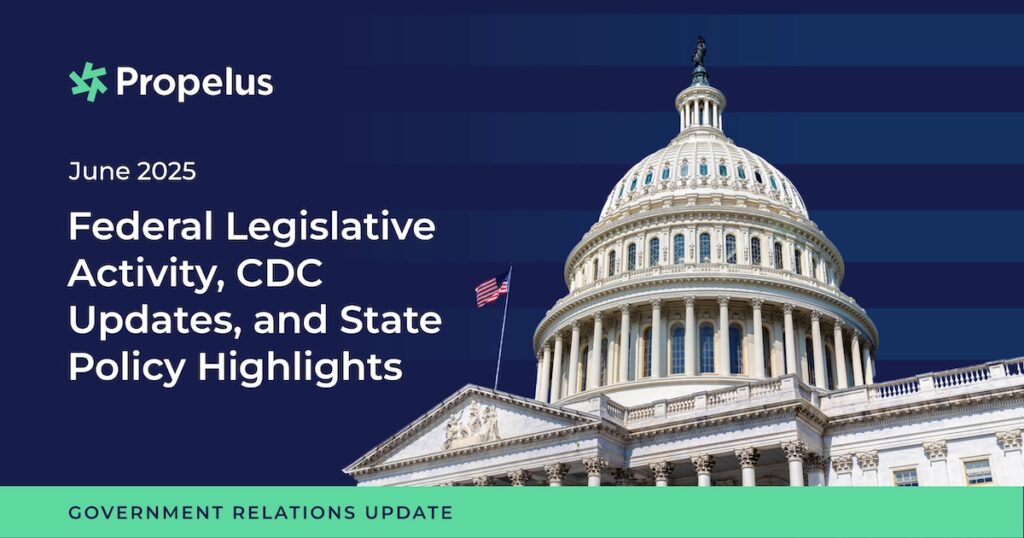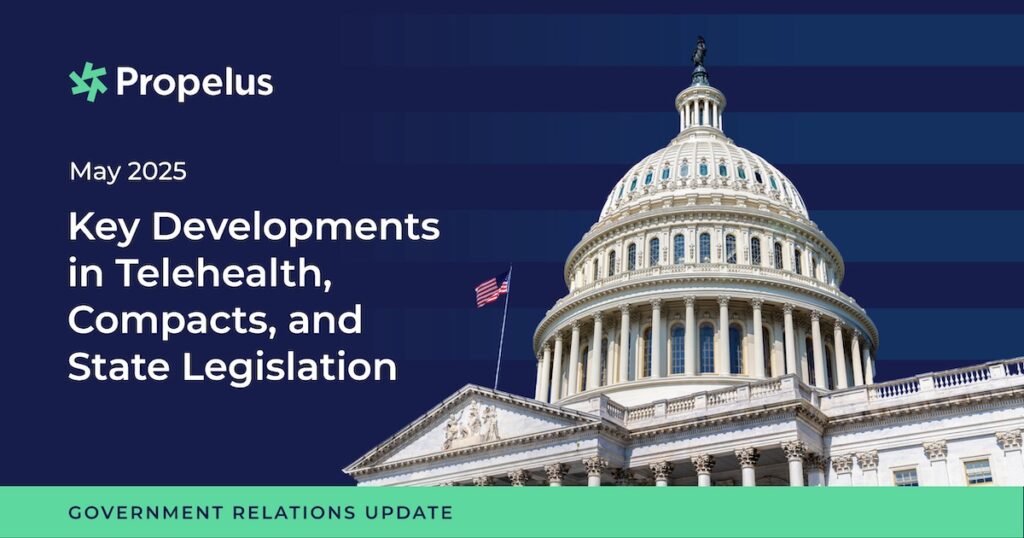June Government Relations Update: Federal Legislative Activity, the CDC, and State Policy Highlights

By Kelly Parker, Vice President of External Affairs and Government Relations, Propelus Welcome to the June 2025 edition of our monthly Government Relations Update, your go-to source for navigating the evolving landscape of nationwide legislative and policy initiatives. This month has seen significant movement in healthcare policy at both the federal and state levels, with a focus on workforce flexibility, artificial intelligence in healthcare, licensure reforms, and more. Here’s a rundown of the key updates. Federal Legislative Activity Two notable bills are making their way through Congress, aiming to enhance the flexibility and oversight of healthcare professionals. Senator Ted Budd (R-NC) introduced the Strategic Teams for Organized Response Mobilization (STORM) Act (S.1701), which seeks to enable the use of healthcare workforce platforms during emergencies and coordinate with states to waive in-state licensure requirements for out-of-state professionals. This legislation also emphasizes the development of model procedures for licensure waivers and the provision of liability protections for workforce platforms. Separately, Representative Jen Kiggans (R-VA) introduced H.R. 3636, which directs the Department of Defense (DoD) to create a centralized system for verifying healthcare professional licenses within DoD medical facilities, aiming for a rapid verification process. CDC Advisory Committee Changes In a significant development, US Department of Health and Human Services (HHS) Secretary Robert F. Kennedy Jr. dismissed all 17 members of the Centers for Disease Control’s (CDC’s) Advisory Committee on Immunization Practices (ACIP), which advises on the vaccine schedule and immunization coverage. This move, effective June 10, aims to “reestablish public confidence in vaccine science” and ensure the new committee members “prioritize public health and evidence-based medicine.” New appointees include a diverse group of medical and scientific professionals. State Policy Highlights States are actively shaping the future of healthcare through various legislative efforts. Here are some updates across key areas. Artificial Intelligence & Health Care Illinois – HB 1806 (Wellness and Oversight for Psychological Resources Act): This bill, which has passed the state legislature, regulates the use of AI in therapy and psychotherapy. It allows licensed professionals to use AI as a support tool but prohibits AI systems from independent client interaction, therapeutic decision-making, or generating treatment plans without professional review. Louisiana – HR 313: This resolution urges Congress to ensure physicians retain full control over medical decision-making, define national standards for AI in healthcare, and prioritize patient safety and data privacy. Interstate Compacts The trend of states joining interstate compacts continues to grow, facilitating cross-state practice for healthcare professionals. Pennsylvania – HB 668: The Pennsylvania House passed legislation to join the National Counseling Compact, which would allow licensed counselors to practice across state lines. The bill now moves to the Senate. Iowa – HF 300: Signed into law on May 27, this bill enters Iowa into the Physician Assistant Licensure Compact, making it the 17th member state. Healthcare Fraud Texas – HB 4012: A proposed “bounty-style” system allowing private citizens to sue over alleged healthcare fraud failed to advance in the legislative session. Licensure & Regulation Tennessee – HB 979: Enacted on May 21, and effective January 1, 2026, this law creates licensure for Anesthesiologist Assistants (AAs) under the Tennessee Board of Medical Examiners. Oklahoma – HB 2298: Despite a gubernatorial veto, this bill was enacted and takes effect November 1, 2025. It grants nurses full practice authority and independent prescriptive authority, removing mandated physician oversight. Texas – SB 912: Enacted on June 20 and effective September 1, 2025, this legislation mandates all healthcare licensing boards to implement modernized continuing education (CE) verification systems and confirm CE compliance before license renewals. Telemedicine Efforts to establish telehealth registry-only systems without requiring full state licensure failed during the 2025 legislative sessions in Texas, Wyoming, and Montana. These updates highlight a dynamic legislative landscape, underscoring the ongoing efforts to adapt healthcare policy to evolving needs, technologies, and workforce demands. Stay tuned for more developments in the coming months!
May Government Relations Update: Key Developments in Telehealth, Compacts, and State Legislation

Key May updates in telehealth, licensing compacts, and state laws impacting healthcare—insights from Propelus Government Relations.
